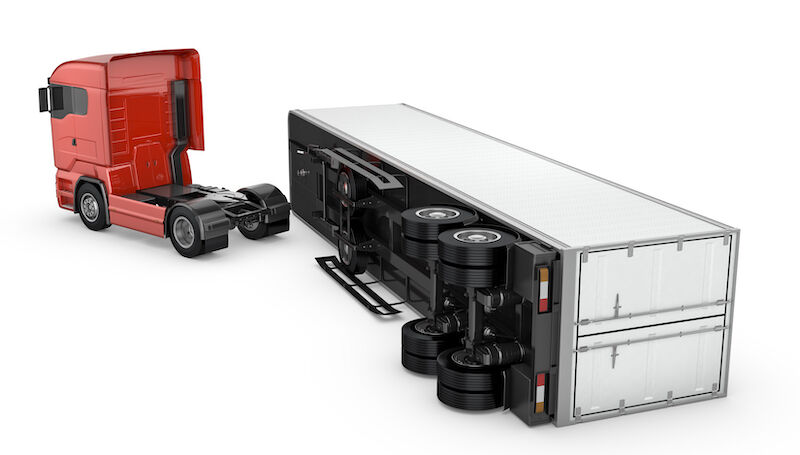
For most motorists in the United States, driving on the highway is a frequent or even daily experience. Something that drivers must then inevitably deal with is the presence of large commercial trucks alongside them on the road. While these vehicles deliver essential goods and keep the economy rolling, their sheer size and potential hazardous contents necessitate responsible driving practices by everyone on the road.
One of the most scary experiences a driver can have on the road is seeing a commercial truck’s trailer detach from the big rig hauling it. While this is quite uncommon, an uncontrolled trailer can wreak tremendous havoc amongst other vehicles. If you experience a collision caused by a detached trailer, you may be able to secure compensation in a San Antonio truck accident lawsuit. Read on to learn about potential causes of trailer detachments, spotting the issue before it occurs, and preventive measures you can take to protect yourself.
Causes of Trailer Detachment
Several factors can contribute to a trailer detaching from its hauling truck. First and foremost, mechanical failures within the hitching mechanisms pose a significant threat. Wear and tear on components like kingpins, fifth wheels, and locking mechanisms can lead to gradual weakening. The gradual degradation of these parts over time increases the risk of detachment occurring when the truck is operating normally. In some cases, these issues may be present from the very beginning due to a manufacturing defect.
Human error can also be a contributing cause of trailer detachments. Improper hitching procedures, neglecting to properly secure locking mechanisms, or failing to double-check connections can leave the trailer vulnerable to detaching even under moderate stress. Overloading a trailer or distributing cargo unevenly can create a dangerously unstable load that overwhelms the capacity of hitching components.
Extreme driving conditions can also make a detachment much more likely to occur. Rough terrain, sharp turns, or sudden braking can place immense strain on the hitching system. In areas with harsh weather, corrosion and ice buildup on components can also compromise their functionality and increase the likelihood of failure.
Recognizing Warning Signs of a Potential Detachment
Vigilance on the part of truckers is key to stopping trailer detachments before they have a chance to occur. Truckers should visually inspect their vehicles frequently to check for any potentially dangerous conditions. They should begin by observing the trailer’s alignment with the truck. Any noticeable misalignment could indicate a compromised hitching mechanism. Similarly, any unusual movements of the trailer, such as excessive swaying or bouncing, should be observed and corrected as quickly as possible.
Drivers should also listen carefully for any unusual noises emanating from the hitching area. Grinding, clanging, or scraping sounds could be signs of stress or wear on components. Also pay attention to the truck’s handling and steering characteristics. Any sudden changes in responsiveness, vibration, or difficulty maneuvering could indicate a compromised connection between the truck and trailer.
Minimizing the Risk of a Trailer Detachment
Thorough pre-trip inspections offer an effective way to detect and prevent problems before they arise. Truck drivers must implement rigorous protocols to ensure secure trailer attachment before embarking on any journey. This includes visually inspecting all hitching components, checking for wear and proper engagement of locking mechanisms, and verifying even weight distribution within the trailer.
Trucks should be properly maintained in accordance with manufacturer recommendations, to significantly reduce the risk of mechanical failures. Additionally, all truck drivers should undergo comprehensive training on safe hitching procedures to ensure they can adequately maintain their vehicle. Drivers must learn proper techniques for coupling and securing trailers, understand weight limitations and load distribution principles, and be aware of the impact of driving conditions on hitching stability.
Technology can also lower the chances of a truck detachment occurring. Onboard safety systems equipped with trailer sensors and monitoring tools can alert drivers to dangerous issues with their cargo, allowing them to proactively address the situation.
What Should You Do if a Truck Trailer Detaches?
In the unfortunate event of a trailer detachment, both drivers and authorities have crucial roles to play. Drivers facing this situation should prioritize the safety of everyone on the road, including themselves. They should immediately slow down, activate their vehicle’s hazard lights, and attempt to steer the truck to the shoulder of the road. If possible, they should then notify authorities to report the detached trailer so that an emergency response can be mustered.
Once highway authorities receive a call about a detached trailer, they should take immediate action to secure the scene and minimize further risks to motorists. A buffer zone of traffic cones and warning signs should be deployed to move traffic safely around obstructions and the trailer should be removed from the highway as quickly as possible. Other drivers can help by practicing defensive driving, thus avoiding the worst of the situation from the onset of the detachment.
Responsible Driving Reduces the Risk of Trailer Detachments
Trailer detachments may be fairly rare, but it pays to be prepared for anything that could happen when you’re on the highway. By developing a deeper understanding of the causes, signs, and preventive measures of trailer detachments, you help keep everyone on the road safe.
